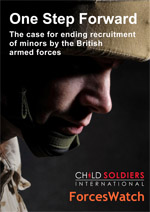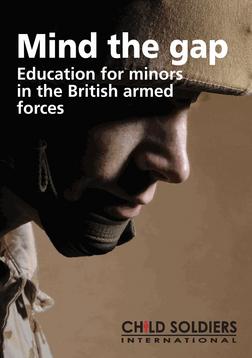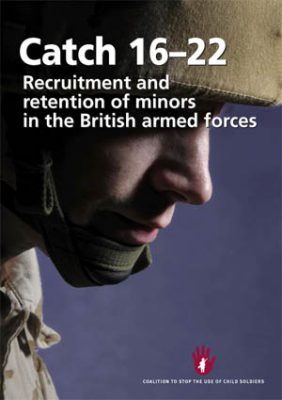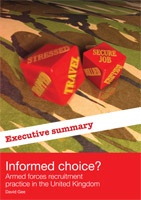research & reports
research & reports
One Step Forward: The case for ending recruitment of minors by the British armed forces

This report published by Child Soldiers International and ForcesWatch outlines the numerous ethical and legal concerns related to rhe recruitment of under-18s, including the disproportionately high level of risk they face and long-term consequences for their employability, as well as detailing how much more it costs than recruiting only adults.
Mind the Gap: Education for minors in the British armed forces

Published by Child Soldiers International. This report concludes that the impact of recruitment below the age of 18 opens up a number of gaps that have long term significance, not only for the armed forces but also for the young people that they recruit. At a time of considerable downsizing of the army in particular, the large gap between the cost of training minors (who cannot be deployed operationally) and adults (who can) is difficult to sustain. But perhaps the most significant cost is in the detrimental impact that the gaps identified have on the future prospects of minors recruited by our armed forces.
Report of Inquiry into National Recognition of our Armed Forces
Published by the Labour Government in 2008, the report made forty recommendations for 'increasing visibility', 'improving contact', 'building understanding' and 'encouraging support' for the Armed Forces.
Catch 16-22: Recruitment and retention of minors in the British Armed Forces

This report, published by the Coalition to Stop the Use of Child Soldiers, "challenges the status quo currently surrounding the situation of young people in the UK armed forces today. It questions the ethics and legality of the restrictions on young recruits’ rights of discharge, their minimum period of service, and their exposure to the risk of hostilities. The report also makes the case for a considered review and debate on the minimum recruitment age. It highlights the evidence that not only is the experience of recruits in the 16 – 18 age bracket adversely affected by their relative lack of maturity, but that their high drop-out rate results in millions of pounds in wasted expenditure."
Informed Choice? Armed forces recruitment practice in the United Kingdom

An independent report by David Gee, published in 2007, highlighting the risks posed to young people through joining the military, how young people from disadvantaged communities are targeted, how information available to potential recruits is often misleading and how the terms of service are complicated, confusing and severely restricting. The research found that a large proportion join for negative reasons, including the lack of civilian career options.
UK Parliamentary Joint Committee on Human Rights report on Children’s Rights
In their report on Children's Rights, the UK Parliamentary Joint Committee on Human Rights recommended that the 'UK adopt a plan of action for implementing the Optional Protocol, including these recommendations, fully in the UK, together with a clear timetable for doing so.' The UN Committee on the Rights of the Child recommendations under the Optional Protocol were that the UK 'reconsider its active policy of recruitment of children into the armed forces' and a number of other measures.
Reimagining Remembrance
In this report, the think-tank Ekklesia, argue that Remembrance Day needs to be re-imagined to make it more inclusive, more truthful and more meaningful for future generations, says this report. This would include an honest acknowledgement that some did “die in vain”, an end to “selective remembrance”, a positive stress on peacemaking, and making Armistice Day a bank holiday. The report follows the death of the 'last Tommy', Harry Patch from World War 1, who sadly described current patterns of Remembrance Day as “just show business”.
Army recruiters visit London’s poorest schools most often
This research published in 2010 has found that the army visited 40% of London schools from September 2008 to April 2009 and disproportionately visits schools in the most disadvantaged areas. The researchers conclude that, “the army's recruitment activities in schools risk jeopardising the rights and future welfare of the young people contacted.
